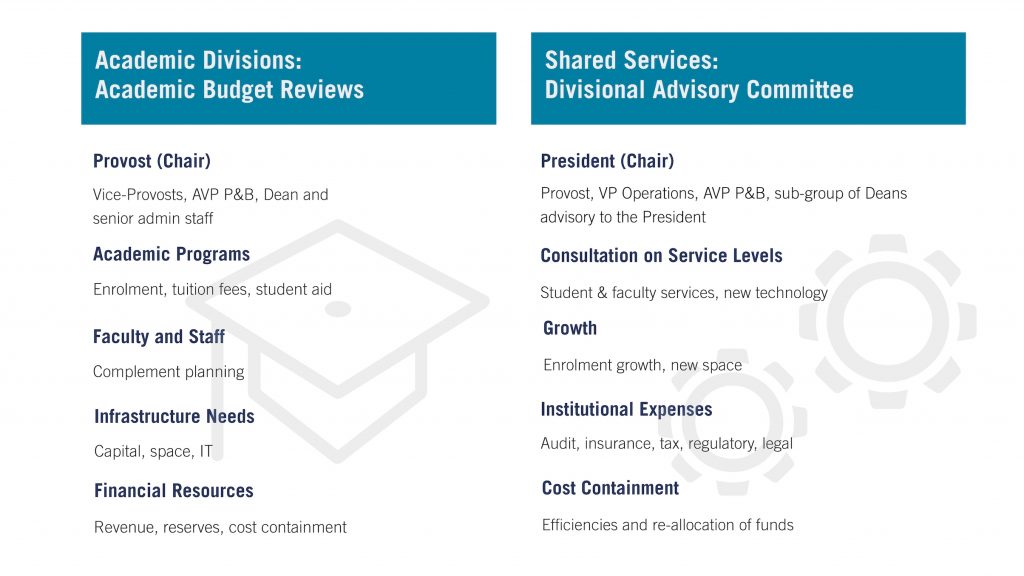The budget-setting process at the University of Toronto is very much a bottom-up process, whereby Deans and their teams in academic divisions and departments, and Principals and their leadership teams at UTM and UTSC, look at their own revenue and expense budgets and make decisions locally. Decisions are rolled up for review and approval, informed by relevant economic factors, risk assessments, collective agreements, provincial and University policies and then approved by administration and governance.
An essential and major part of the annual budget process is the formal process for budgetary reviews for campuses, academic divisions, and shared-service divisions. Two review processes are conducted annually, one for shared-services and the associated university-wide costs, and the other for UTM, UTSC, and the academic divisions.
Each shared-service division prepares multi-year budget plans for its units. These plans are reviewed by the President, who takes advice from the Divisional Advisory Committee (DAC), which includes the Principals at UTM and UTSC, and representative Deans of Faculties. The purpose of the review is two-fold. First, the review ensures that any proposed changes in services are aligned with the needs and priorities of the academic enterprise. Second, the review establishes spending priorities, considers the alignment of services between those provided institutionally and those provided in the divisions, and ensures that all possible cost reductions have been examined.

The annual academic budget reviews (ABRs) take place throughout the fall term. Each division submits a multi-year budget plan to the Provost based on its academic plans. Revenue projections are based on enrolment plans, new program offerings, advancement outcomes, etc. Expense projections take into account cost increases, changes in faculty and staff complement, student financial support, etc. These plans are discussed in individual review meetings with a Provostial committee that includes the Provost, the Vice Provost Academic Programs, the Vice President University Operations and Real Estate Partnerships, and senior staff in Planning & Budget. The reviews inform approvals of enrolment targets, academic appointments, allocations from the University Fund, approval of campaign priorities, and approval of capital plans.
The review process, whether for academic or administrative divisions, amounts to a high level of engagement by the UTM and UTSC principals, as well as Deans and members of the senior administration in the budget process. As a result, budgetary allocations are informed not only by the overall budget situation of the University but also by the circumstances of individual divisions and by their academic values and priorities. Cost containment measures, which are often necessary because of the constraints on revenue, are applied by each campus and academic division based on its own circumstances. The involvement of members of the senior administration leads to a deeper understanding of the nature of the University’s expenses, how services can be best delivered, and where and how savings may be realized.
For additional information on the annual budget planning process please review – The Budget Process, An Overview

